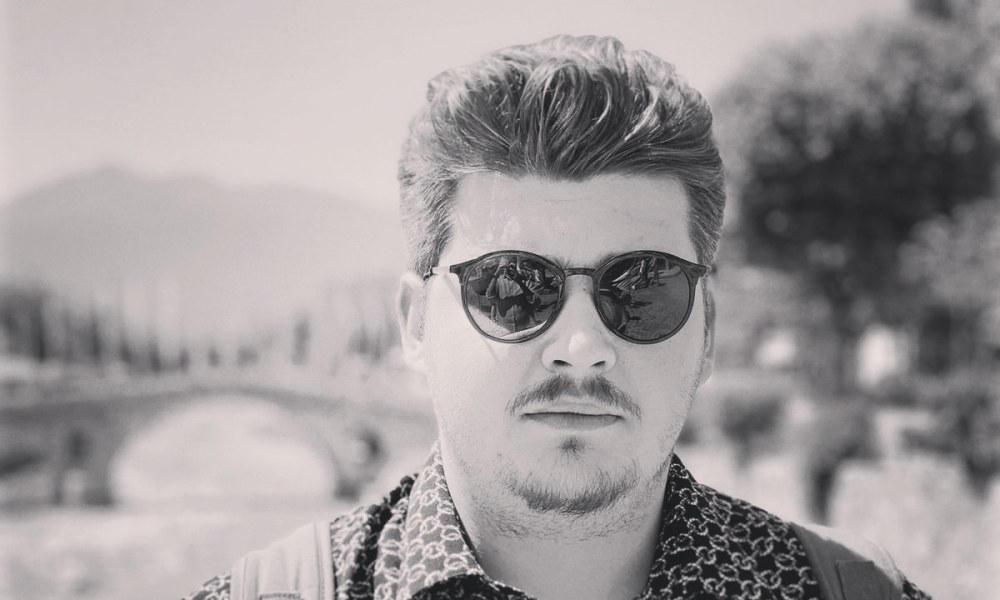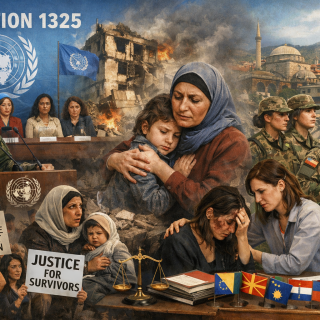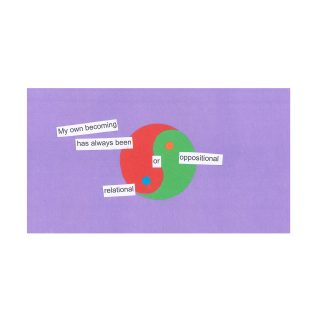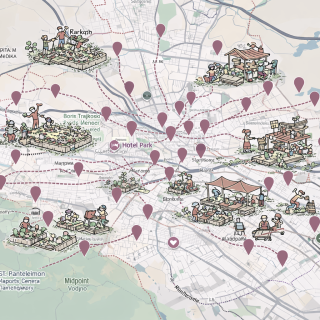A person’s birthplace plays an important role in identity formation. I personally do not consider Stolac only my home, but also the place in which I became aware of the importance of an active participation in social changes. From the earliest days, I felt the need to fight against injustice and engage for values that I consider to be the right ones. In Stolac, this is not a preference, but rather a pressing need – in order for the city to become more serene, since it is overshadowed by social and political issues, in spite of the sunny bridges over Bregava and figs admired by tourists and passers-by.
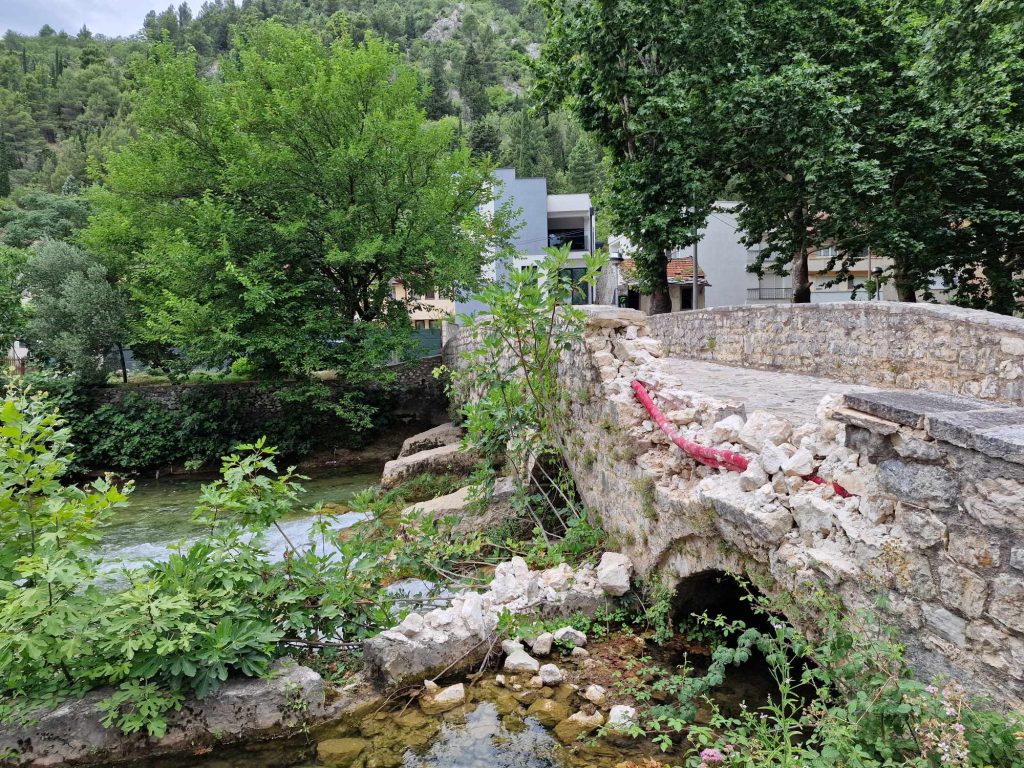
My first steps as an activist were a consequence of the injustice I witnessed, since I got educated in a system that includes the so-called ”two schools under one roof”. Music was my only source of inspiration and strength for action, giving me a window into the world, dreams about a better Stolac and a ”single roof” that would be enough for all of us. I first learned about activism at the end of 2000s, while I was still living in Stolac and attended the School of Different Memories organised by the Youth Initiative for Human Rights (YIHR) in Bosnia and Herzegovina. The attendance of this school was a deeply moving experience, since I was able to discover incredible facts about crimes committed in my hometown, which were frequently covered up or minimised. I was hurt by the extent of my ignorance as a young person, who grew up in this region. Having learned about the facts, I focused on further study of war crimes and tried understanding them first, and then explaining them to other young people. I believed that it was important for them to know why the situation back then was the way it was, to face it and to try to find a path towards a common future. Years later, I also participated in the organisation of the School of Different Memories.
Today, I am 27 years old and I look back at the small steps we achieved in the society. I witnessed small, but important changes achieved by the activists. We were telling the truth irrespective of the consequences and our surroundings. I am not saying that we are the instigators of wide reaching changes, but even a single voice that does not allow others to keep silent about the past is already enough.
The memorial in Kazani was built near Sarajevo as a symbol of remembrance of mostly Serb victims, the Genocide and War Crime Denial Ban Law and the Resolution on the Genocide in Srebrenica were adopted. In my opinion, these are important events for justice and the path towards reconciliation. I spoke about this and worked on activities for young persons focusing on these topics. I was unable to adopt a law, I am not a UN ambassador to be able to propose resolutions, and I also did not have the power to order the construction of a memorial, but I nevertheless used the resources at my disposal to point out that it was necessary.
It is not up to us to achieve all changes, but rather to be the voice reminding others of the importance of justice and making the truth known. Every action, no matter how small, is a step towards progress. As a result of activism and facing the past programmes, I met people from the region and we exchanged opinions, agreed on many things, and in some cases we disagreed, but it does not matter. I have won valuable friendships with persons from the whole region. We exchanged ideas and worked on projects aimed at overcoming the differences and promoting mutual understanding. I learned about and accepted their culture and taught them about ours. They know where Stolac is located and how cold Bregava is in the summer. An important segment of activism is always the cultural dialogue – learning about other cultures and traditions, while sharing one’s own experiences and identity with others.
Today, I see that those persons against whose ideas we fought are making great efforts to impose their own perspectives and erase the memories. We are facing strong pressure from revisionists who are trying to revise the history and marginalise the victims. This is a challenge we have to face on a daily basis in order for the past to finally remain where it belongs and in order not to be haunted by it anymore – everyone of us in a different manner.
We need new young activists who will achieve more than we did, because our opponents are more engaged than ever before. The future lies in the hands of the new generations that will continue fighting for justice and human rights. They should build even stronger relations and act jointly in order to face today’s challenges.
It is necessary to be a host and a guest at the same time, get to know this country, but also the neighbouring countries. Another important thing is for young activists to get to know each other and start cooperating, build networks between communities and strengthen regional understanding and solidarity.
I will never forget friends I met in Goražde, Banja Luka, Prizren, Belgrade, etc.
The trips I took as part of my activism have enabled me to meet incredible persons and see cities throughout the Balkans. Every of these persons has a place in my heart and I will always remember them as symbols of courage and resistance. If I could choose my life path again, I would do everything again, in spite of all difficulties and unpleasant situations, even dangerous ones. In spite of challenges and difficulties, I would not change anything. Activism has given me a sense and purpose, and has contributed to my personal growth and development. And I would repeat it, since it was crucial for my further life path, growth, learning and thinking.
Today, it is more important than ever before that new generations of youth in the Balkans assume the accountability for shaping a better future. The Balkans have huge potentials, but to be able to use them, it is necessary to overcome the divisions and manipulation of the past, to promote a dialogue and solidarity and to actively fight any kind of injustice and intolerance.
And to go back to Stolac, the place I always go back to, either physically or in my thoughts – there was no public call for activists in Stolac back then, when we were young and wished to be activists, and it was not even popular back then. However, we knew that the city needed us. Today, it needs new young people that will step up, although today there is even less demand for it than back then.
Muhamed Tucaković is a graduate student of the Faculty of Political Sciences of the University of Sarajevo, Department for International Relations and Diplomacy. He is a long-term activist of the Youth Initiative for Human Rights and has participated in numerous programmes since 2014. In 2018, he became a programme assistant. Following his engagement at YIHR BiH, he also worked as a project coordinator at the association Zaboravljena djeca rata. He is one of the co-founders of the informal youth group Treća smjena from Stolac that has become well-known for its cultural activities in this city. He is interested in transitional justice, facing the past and strengthening youth activism.
